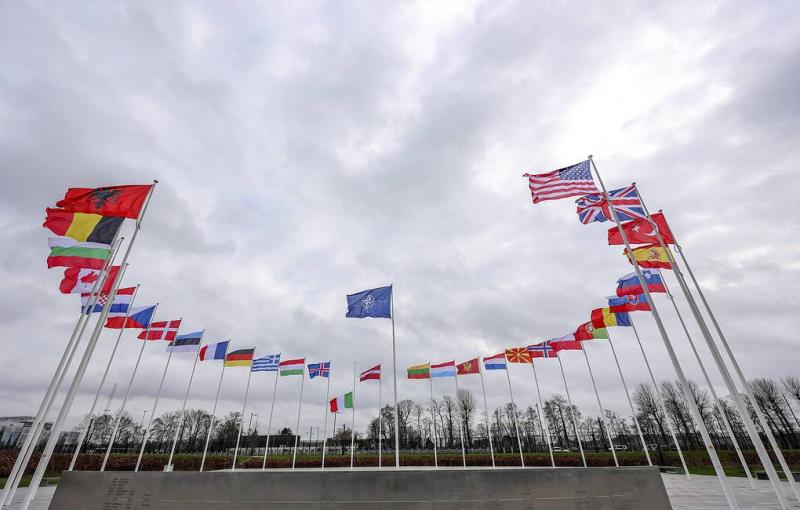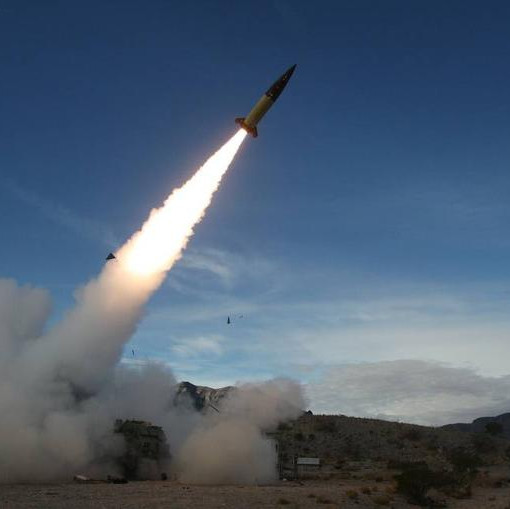
© AP Photo/Olivier Matthys/TASS
Top stories from the Russian press on Friday, January 27th, prepared by TASS
NATO countries plan to discuss fighter jet supplies to Ukraine, Kiev seeks to shift public attention away from the bad news coming from the front and tensions between Beijing and Washington are about to rise once again. These stories topped Friday’s newspaper headlines across Russia.
Vedomosti: NATO to discuss sending fighter jets to Ukraine after tanks
Internal discussions about the possible supply of fighter jets to Ukraine are underway between NATO countries, Politico reported, citing sources among officials and diplomats. According to the negotiators, debates on aircraft deliveries may turn out to be even more fierce than the disputes on tank supplies, Vedomosti writes.
The Baltic countries are said to be among the ardent supporters of the idea of sending fighter jets to Ukraine. In the meantime, according to one of Politico’s sources, Washington informed Kiev’s representatives that aircraft supplies are currently impossible. The issue of providing fighter jets to Ukraine may become one of the topics that the defense ministers of Kiev’s allies will discuss at a meeting at the US Ramstein base in Germany in February.
The United States apparently seeks to step up the conflict in Ukraine, which is why it continues to flood Kiev with equipment, head of the Center for North American Studies at the Russian Academy of Sciences’ Institute of World Economy and International Relations Viktoria Zhuravleva noted. Clearly, the common policy of support for Ukraine will persist and will be consistently implemented, with each new step in that direction only escalating the conflict. The Republican opposition in the US can hardly be expected to actively resist more weapons supplies. Moreover, the Republicans are facing pressure from defense companies such as Lockheed Martin. The most they will be willing to do is strengthen control over supplies but they will not reduce financial support for Kiev, let alone technical assistance, the expert emphasized.
The provision of Western-made warplanes, even outdated ones, still appears to be unlikely in the medium term, said Alexander Yermakov, a researcher at the Russian Academy of Sciences’ Institute of World Economy and International Relations. According to him, this equipment, new to the Ukrainian Air Force, requires much time and resources to create the necessary infrastructure for its use. This is why, in Yermakov’s words, the supply of a small number of available Soviet-made aircraft looks relatively likely at this point, which would include MiG-29 planes from Poland and other Eastern European countries.
Izvestia: Why Washington seeks to anger China once again
Tensions between Beijing and Washington are starting to rise once again. According to media reports, Kevin McCarthy, who succeeded Nancy Pelosi as Speaker of the US House of Representatives, also plans to visit Taiwan in the spring. Pelosi’s trip to the island caused a lot of noise last August, bringing the US and China to the verge of an armed conflict, Izvestia notes.
Director of the Center for Comprehensive European and International Studies at the Higher School of Economics Vasily Kashin points out that the US seeks to prevent Taiwan’s reunification with mainland China. "The Americans have already departed from a number of obligations enshrined in US-Chinese communiques, particularly the obligation not to increase weapons supplies to the island. Those are only growing and will continue to grow. As US-China relations deteriorate, Washington is stepping up military cooperation with Taiwan, also gradually raising the level of political ties. The Americans are coming closer to the threshold where it will be possible to talk about the actual recognition of Taiwan," the political scientist explained.
According to the expert, visits by high-ranking US officials to the island are steps aimed at escalation. "Since Pelosi’s visit, military activities have been on the rise. If a military operation to seize Taiwan takes place, it will be the largest amphibious assault operation since World War II. No one knows if the Chinese authorities have made a decision on that. If so, the decision will take quite a long time to implement and no one will look at some US Congress member before launching an operation that the world’s future depends on. Perhaps, the decision has already been made. Or maybe not. However, the probability of a war starting in the coming years does exist," the expert stressed.
Kashin believes that the US is deliberately provoking the Chinese. "It seems, the Americans expect themselves to emerge victorious from this conflict, or they simply underestimate China’s resolve," the expert concluded.
Nezavisimaya Gazeta: Zelensky trying to shift public attention away from from frontline’s bad news
Ater Germany and the United States had agreed to send tanks to Kiev, Ukrainian President Vladimir Zelensky stated that he had no interest in talks with Russian leader Vladimir Putin. Experts attributed such an escalation in rhetoric to Kiev’s attempts to shift the focus of public attention from the latest negative news from the frontline, including reports of the loss of Soledar, Nezavisimaya Gazeta notes.
Kiev’s statements about the lack of interest in talks with Russia look like yet another attempt to escalate the situation, said Nikita Danyuk, deputy director of the Institute for Strategic Studies and Projections at the People's Friendship University.
According to the expert, as for the impact of such statements, they also make the majority of the Russian public lose interest in negotiations with the current Ukrainian government, as well as in Zelensky’s subjectivity. Although it is clear that when taking action, the Ukrainian leader is guided by support from the West, primarily the United States.
On a noteworthy point, it was just yesterday that the Armed Forces of Ukraine, for the first time, admitted losing Soledar, despite the fact that they had been denying reports on the matter for days. There clearly has been some movement along the frontline and the Russian army has the initiative again. In such a situation, Zelensky, who is experienced in PR, is obviously trying to shift the public’s focus, Danyuk pointed out.
Rossiyskaya Gazeta: Europe paying the most for Russian oil and gas
Europe has been shelling out the most money on the export of Russian oil, gas and oil products since the beginning of the year, Rossiyskaya Gazeta writes, citing Finland’s Center for Research on Energy and Clean Air (CREA).
In terms of the actual volumes of supplies, Asia-Pacific nations have long left the European Union behind, but the EU pays much higher prices for Russian hydrocarbons, regardless of the sanctions and price ceilings. It’s difficult to calculate the overpayment with no access to statistics, but it can be done approximately for gas. Russia’s daily gas supplies to the EU currently stand at about 66 mln cubic meters, while China gets some 43 mln cubic meters a day, that is, about a third less. However, China paid €30 mln for gas exports last week and the EU paid €·170 mln.
The difference is too obvious to ignore it. This is probably why many EU countries expressed a desire to lower the price cap on Russian oil in January, with the US opposing the initiative. The idea was to bring the price ceiling down to $50-55 per barrel. However, CREA experts believe that the final goal will be to set the price of Russian oil at $25-35 per barrel.
Taking the price ceiling to that level would mean that the Russian government will get almost no money from the oil industry, said head of the Energy Development Center Kirill Melnikov. As for companies, they probably could survive such a scenario. However, these are empty speculations because the price ceiling currently has no direct impact on Russian oil rates. The ESPO crude is selling well at prices above the ceiling because it is shipped from the Far East straight to Asian markets, while the Urals oil, which used to be shipped to Europe, has to be transported from a long distance. In other words, if there is a price cap of $30 per barrel, everyone will simply bypass the limitation and it clearly will not work.
In case price ceilings are lowered deliberately, affecting Russian oil prices, the country can always reduce output. And if there is a global oil shortage, no price caps will work at all.
Media: Container shipments from Russia climb as China loosens lockdowns
The lifting of coronavirus restrictions on cross-border transportation operations with China has been having a positive impact on container shipments, Russian Railways Deputy Director Alexey Shilo said. In January 2023, shipments rose ten percent higher than in November and December 2022, and turned out to be 68% more than in January 2022, Vedomosti writes.
In February, Russian Railways plans to hold talks on the parameters of cargo transfers through border crossings with China in 2023, Shilo noted. The parties intend to discuss increasing the overall number of trains traveling across the border. "In particular, our goal is to have more container trains because there is great demand for containers meant for Chinese checkpoints, which far exceeds the parameters that were agreed on with China," the official added.
President of the Transportation and Infrastructure national research center Pavel Ivankin believes that the likelihood of agreements with China on increasing the transportation of goods is "quite high."
"Once the coronavirus restrictions are lifted in China, the situation is expected to improve because they largely hindered the operation of terminals," Infoline Analytics Director General Mikhail Burmistrov added. There is huge potential for increasing the passage of goods through ground terminals, given port congestion in the Far East, the expert noted.
Market players confirm the upward trend for shipments. A spokesperson for the Eurosib SPb - Transport Systems told Kommersant that shipments had increased by 15-20%.
Ivankin points out that in an optimistic scenario, container shipments with China may double in 2023 and climb 25-30% under a pessimistic scenario.









